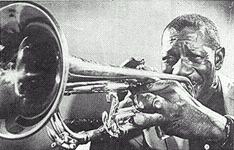|

Cladys "Jabbo" Smith: Personal Interview
by: Mike Joyce for Cadence
in May 1982
--------------------------------------------------------------------------------
Jabbo
Smith on the Jenkins Orphanage Band:
Cadence: Let's begin way back with your days in the oprhanage.
Jabbo:
I left there when I was about 16.
Cadence: It seems like you came out of there with a really good understanding of
music. What kind of music teaching went on in the orphanage?
Jabbo: They had Alonzo Mills, he was my teacher there
then. He was very good, started you off with the rudiments, before you get the horn. In a couple of months he'd give you that
horn.
Cadence: Did you start off on the trumpet?
Jabbo: No, the trombone. You see, the way he taught you,
he'd teach everybody in the same room. So you're hearing what he's telling everybody else. So you play all the instruments.
I play all the brass instruments.
Cadence: The orphanage had a brass band.
Jabbo: Oh yeah, they had six brass
bands. At the time he called me I was on the yard, they called me "yard boy," that's when you're not doing anything. They
try to give you some sort of trade like carpenter or shoe making or bakery, you know. If you're not doing nothing they call
you a yard boy - you're just out there picking sticks up (laughter). So one day Mr. Mills came out and he called "You come
here - you come here." And you know how kids are, they'd be beating on pans and things; you'd want to be a drummer, everybody
wanted to be a drummer. So I guess he must have thought you were musically inclined or something. He called me in that bunch
that he had picked out. Then he'd just sit you down and give you a little lecture what music was all about. I have a book
over here called "The Jazz Nursery" about these fabulous people. He's about the most famous person, to me. Martin Luther King
was all right, but brother D.J. Jenkins was the man. He'd take these kids, just orphan kids, he'd take them from the jails,
anywhere, everybody would just send the kids there, and that was fabulous, to keep the little kids out of jail. He would train
them.
Cadence: Did you actually tour with these kids?
Jabbo: Oh yes. The idea for the band was to raise money
for the orphanage. Jenkins was just a famous man, from the git-go he was just a born leader.
Cadence: What kind of
music were you playing with the orphanage band?
Jabbo: That was something beautiful about the orphanage. They's start
you off playing, after you learned your fingering and all, learned what music was all about, then you'd start to playing hyms,
like "Nearer My God To Thee" and good things like that. They'd start you playing hymns, marches, then you'd graduate to overtures
and things like that. By the tme you get out of there you're well versed, because he started you from the roots.
Cadence:
Why did you leave?
Jabbo: Well, you know, everybody runs away. That's the only way you get out of there (laughter).
That's one thing I appreciate (about the orphanage), so far I've been over this many times in school - New York, I've been
to New York so many times as a kid. So when you get out you know where you want to go.
Cadence: When you got out of
there you were pretty fast on that horn and you were only 16 or 17 years old.
Jabbo: 16
--------------------------------------------------------------------------------
Jabbo Smith on playing with other bands:
Cadence: How did that "Black and Tan Fantasy" come about with Ellington?
Jabbo: Well, I think Bubber must have been sick or something. And he needed somebody to substitute so he asked if
I wanted to do it.
Cadence: Tell me about the Charlie Johnson band, and your own band, the Rhythm Aces.
Jabbo:
The Rhythm Aces was Ikey Robinson's, it was just a pick up band. That's what I was sayin' about those guys back then, they
didn't have to have all this music. It didn't have to be written down, we could go to the studio and I could hum these things
to these cats and everybosy got it from there. They were fabulous, 'cause they had fabulous musicians, like Lawson Buford,
Omer Simeon and Ikey Robinson and Cas Simpson, just fabulous cats. Charlie (Johnson) had the best band in New York, no doubt
about it. He had Benny Waters, Benny Carter, and Edgar Sampson, that's the front line! I used to double on trombone with Charlie.
In fact, I think we were the first to have two trombones 'cause I doubled with Charlie. Before that you could see one trombone
in the band; now they got 4, 5. Anyway we had Cliff Bradenton (?), myself, Charlie in the brass section; Cyrus Sinclair on
the tuba, Bobby Johnson playing guitar, Charlie himself on the piano. This was what was crazy, Charlie would come in in the
night and start the band off, and he'd be gone, he'd go somewhere, he'd be gone all night and the band would be jumpin' (laughter).
We had to play them shows and everything, that was a beautiful time. Small's Paradise was the spot.
Cadence: You recorded
with Fats Waller and James P. Johnson.
Jabbo: Yes, we did this thing, "The Sugar Babies"... They were beautiful people,
they were like brothers, just fabulous people. That's the thing I like about musicians, most of them are.
--------------------------------------------------------------------------------
CD001/Best of Early WCJO_Volume 1/Dave Sletten/Jabbo Smith
|

